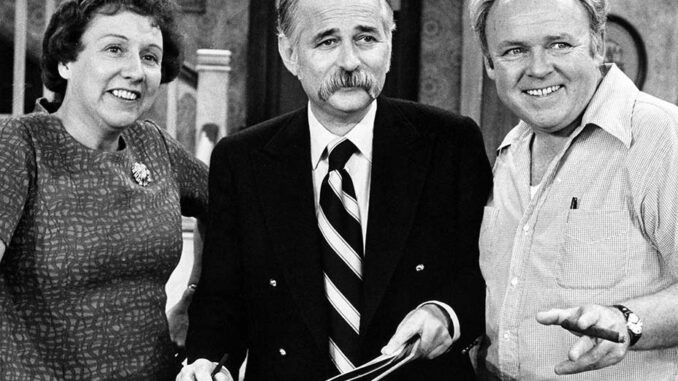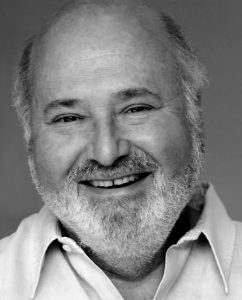
It was easy for television viewers to forget the Vietnam War, the Civil Rights struggle and women’s liberation when immersed in the gauzy nostalgia of The Andy Griffith Show or The Adventures of Ozzie and Harriet. Then, in 1971, producer Norman Lear’s All in the Family lumbered onto the scene and placed those divisions in American life front and center.
“There’s no point of being on television … at this point in time, with what’s going on in this country, and not reflect what’s going on,” television actor and writer Rob Reiner said at the time.
Reiner later won two Emmys for his performance as progressive college student Mike “Meathead” Stivic on All in the Family. However, it was Carroll O’Connor as his father-in-law, the conservative curmudgeon Archie Bunker, who stole the show. All in the Family was intended as a satirical mirror revealing the nation’s racism and bigotry to itself. Unfortunately, America looked into the mirror and liked what it saw.
CBS received fan mail from folks who admired Archie for “telling it like it is” and applauded his prejudice. Social scientists later found by making Archie a “lovable bigot,” the show inadvertently gave bigots watching a way to excuse their behavior.
“Instead of irradicating bigotry, All in the Family reinforced it in racist viewers.”
Instead of irradicating bigotry, All in the Family reinforced it in racist viewers. This example of selective perception is nicknamed the “Archie Bunker effect,” and it’s thriving once more in the person of Donald Trump. While much of the country is baffled by Trump’s popularity, Christian nationalists see him as someone “telling it like it is,” a champion who amplifies and reinforces their own fears and prejudices.
Holding up a mirror again
So, it is fitting that Reiner, who considered Norman Lear a “second father,” is now the one holding a mirror up to America in his new documentary film, God + Country , which investigates the rise of Christian nationalism in the United States.
“I became aware of this during my time with All in the Family and when Norman Lear launched an organization called People for the American Way because it was a pushback against this kind of dogma of Christian nationalism,” Reiner said after a screening of the film at the U.S. Capitol Visitor Center. Baptist Joint Committee for Religious Liberty hosted the event. “Hopefully this film can be a teaching tool to everyone,” he continued. “I think it gives people a good basic understanding to what Christian nationalism is.”

Rob Reiner
Reiner, also known for directing such Hollywood hits as Stand By Me, The Princess Bride, and When Harry Met Sally, produced God + Country and brought award-winning documentarian Dan Partland on board to direct.
“With God + Country, I want to draw attention to this dangerous moment in a way that respects the millions of Americans who are inadvertently subscribing to some subtle forms of Christian nationalist belief,” Partland said.
Almost 50% of Americans favor fusing Christianity with policy, but do not necessarily recognize the mingling of the two as Christian nationalism. Defining Christian nationalism was one of the challenges Partland faced making the film.
“The term is very problematic because it sounds pro-Christian and very patriotic,” he added. “It doesn’t self-describe. The film takes time to explain … it’s actually not a faith at all, it’s a political ideology masquerading as a faith. And turns out it’s not very Christian and totally un-American.”
To illustrate this, God + Country intercuts various video clips of popular preachers like John MacArthur spouting their anti-democratic ideas. “No Christian with half a brain would say, ‘We support religious freedom.’ We support truth!” says MacArthur.
Influenced by Stewart
God + Country is heavily influenced by author and journalist Katherine Stewart’s 2020 book, The Power Worshippers: Inside the Dangerous Rise of Religious Nationalism. In a BJC report on the January 6 insurrection, Stewart wrote that Christian nationalism’s “principal goal, and the goal of its most active leaders, is power. Its leadership looks forward to the day when they can rely on government for three things: power and influence for themselves and their political allies; a steady stream of taxpayer funding for their initiatives; and policies that favor ‘approved’ religious and political viewpoints.”
Following Stewart’s lead, the documentary tracks the spending and data mining done by political conservatives to boost the turnout of Christian voters in elections. Speaking to the Faith and Freedom Coalition in North Carolina, Ralph Reed explains the extent of their operation, “I don’t want to scare you, but we had 147 different data points we tracked.” Republicans used this data to bombard conservative Christians with texts, calls and in-person visits to secure their votes. The party also targets and exploits churches to find potential voters.
“Christian nationalism uses Christianity as a means to an end. That end being some form of authoritarianism,” according to Russel Moore, editor in chief of Christianity Today, in the film.
“If I have decided that America is irreplaceable in God’s story… and democracy gets in the way, well, democracy has to go.”
The filmmakers also interviewed Phil Vischer, creator of Veggie Tales, who said, “Many Christians have come to believe the United States has a special God-ordained role. If I have decided that America is irreplaceable in God’s story… and democracy gets in the way, well, democracy has to go.”

Dan Partland
Partland and Reiner went out of their way to avoid conflating Christianity with Christian nationalism, and so they looked to Christians like Moore and Vischer to explain the movement’s danger to the country and to the church.
“I was concerned that anything that talks about Christian nationalism (would) be viewed as an anti-Christian thing,” Partland said. “We really need to try to tell this story from the outside for people who are not necessarily part of a Christian community, but also we need to be speaking to Christians themselves who are sharing this concern.”
Among those interviewed are scholars Kristin Kobes Du Mez, Jemar Tisby and Anthea Butler, as well as pastors William J. Barber II, Rob Schenck and Doug Pagitt. Journalists Andrew Whitehead and David French, along with Katherine Stewart, also share their insights and concerns.
Immediate pushback
When the trailer for God + Country was released in December 2023, the Christian nationalist community immediately took to social media to voice outrage.
“The Christian conservatives featured in the film took an unimaginable amount of abuse,” Partland said. This movement “doesn’t tolerate dissent of any kind.”
The pushback was especially intense for the African American experts featured in the film. “The firestorm of criticism online based on no more than a trailer and a few social media posts indicates that addressing the threat of white Christian nationalism in a film has agitated the authoritarians,” Tisby wrote on Substack. Maybe the people who seek to enshrine political power under the guise of a small-minded conception of Christianity feel exposed.”
Christian nationalist critics online were quick to point out Reiner’s Jewish heritage, accusing him of wanting to discredit “traditional” Christianity and impose “Jim Crow for Christians” in the United States.
“God + Country is not in any way bashing Christianity; it’s the opposite,” explained Reiner. “It’s basically saying that this movement, which is essentially a political movement, is damaging Christianity, is not only hurting the country but is also hurting Christianity.”
Although he considers himself an atheist, Reiner has a special regard for the teachings of Jesus, he said. “I went through a very tough time in my life … and during that period, I read everything I could get my hands on (from various faiths). I went through a long process of what do I believe. Essentially there’s a unifying idea in all of them which is the teachings of Jesus, which is, ‘Do unto others as you would have,’ ‘Love they neighbor as thyself.’ And so, that’s something I started to think about and strive toward. We fall short, but we keep trying.”
